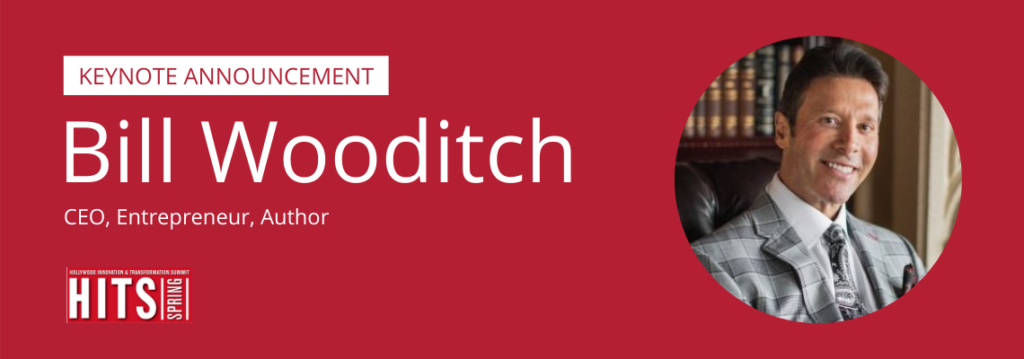
How to Overcome Fear and Use Failure to Help You Succeed and Win
To succeed and win, it is important to overcome our fears and use our failures to learn, according to Bill Wooditch, a sales and leadership coach, author and CEO and president of The Wooditch Group, a corporate insurance and risk management services firm.
Speaking during the keynote presentation “Developing Teams, Services and Customers at Scale” May 12 at the annual Hollywood Innovation and Transformation Summit (HITS) Spring event, he addressed the environment that IT leaders need to create in order to recruit, foster and grow the leaders of tomorrow.
Moving beyond the mission statement mentality and conference table directed strategy of conventional IT, the presentation was designed to help create a new direction for viewers’ teams to become ambassadors, advocates and stewards of customer satisfaction that evolves from the voices, demands and wishes of the consumer.
Wooditch said he was hoping viewers could take away one element from the presentation they could “apply right now to position yourself better to win.” But he pointed out that winning isn’t so simple. “Are you willing to do what it takes to win?” he asked, noting it will take sacrifices.
Just like in the Rocky movies, “there’s always a journey,” he said, noting his journey started in a small, western Pennsylvania town with very cold winters. As a young man dreaming of California, he worked in a factory where he smelled sawdust and lacquer every morning, believing that’s where he would work the rest of his life, he recalled.
But he was able to put aside his fears and find success, going on to become a top salesman at two Fortune 500 companies, he said.
Everybody needs collaboration and cooperation to find opportunities and succeed, he said, noting that, for him, it was his parents that provided him the help he needed to get on the road to success.
 It is crucial to understand the difference between danger and fear, he told viewers.
It is crucial to understand the difference between danger and fear, he told viewers.
“Most of the fears that we deal with today in our boardroom, as we want to grow [and] as we want to recruit people come from basic fear instinct,” he said.
After becoming a salesman, he noted that he “failed 1,575 times a day on the phone and I failed in my first 13 sales attempts, which took me to a place of fear.” What is important in a situation like that is to figure out how to “position ourselves to win” and understand that everybody has similar fears of failure to some degree, he explained.
It is also important to know your own deficiencies, he said, noting his are math and numbers.
Another thing that is crucial to understand, he pointed out: “People work for their agenda, their motive – not yours. Your job is to create an environment that is free from the tentacles of fear and failure, where you give the expectation of direction … and then work together, side by side, shoulder to shoulder to make your dream, your vision a reality.”
For most people, “the biggest obstacle to growth is in our mirror, is our ego,” he said.
People are afraid to fail – but we all fail. We even fail when we learn how to walk, he pointed out. What is important is to “frame our failure,” keep it in perspective and learn how to create an environment that treats failure as an indispensable teacher in developing the people who create your culture that encourages teams to think and act, according to Wooditch.
“Failing forward as a team means you’re able to dissect and have a post mortem on what it was you could have done different,” he said, adding: “When you work together as a team, you learn from each other.”
Innovating is also important, he said, noting BlackBerry didn’t innovate but Apple did.
Leaders should focus on “making an environment where people are free to try and grow” and you must overcome your fears to grow, he told viewers, noting he was able to go from $100 deals as a rookie salesman to closing on $1 million deals four years later.
When recruiting people for his teams, he explained: “What I want is a person who’s a determined advocate. I want a person who has a yes bias baked into their DNA – they will find a way to yes; they won’t default to no and stay inside the book.”
He also wants a person “who is willing to do the work, to know with clarity what it is they want but, most important…. know what you don’t want first,” he added.
Despite challenges created by the COVID-19 pandemic, he said: “I think there’s going to be a tremendous opportunity for those of us who can adopt our approach – and we’ve learned to do a lot of it on Zoom – [and] open our minds as a growth orientation to what worked, what didn’t work and what do people want now – what do they want to experience now from us and how can we deliver that.”
Wooditch is “extremely optimistic,” he said, adding: “We’ve been extremely productive in what we do right now and I think there’s always an opportunity as long as there’s a heartbeat somewhere on the other end.”
HITS Spring was presented by IBM Security with sponsorship by Genpact, Irdeto, Tata Consultancy Services, Convergent Risks, Equinix, MicroStrategy, Microsoft Azure, Richey May Technology Solutions, Tamr, Whip Media, Eluvio, 5th Kind, LucidLink, Salesforce, Signiant, Zendesk, EIDR, PacketFabric and the Trusted Partner Network.
